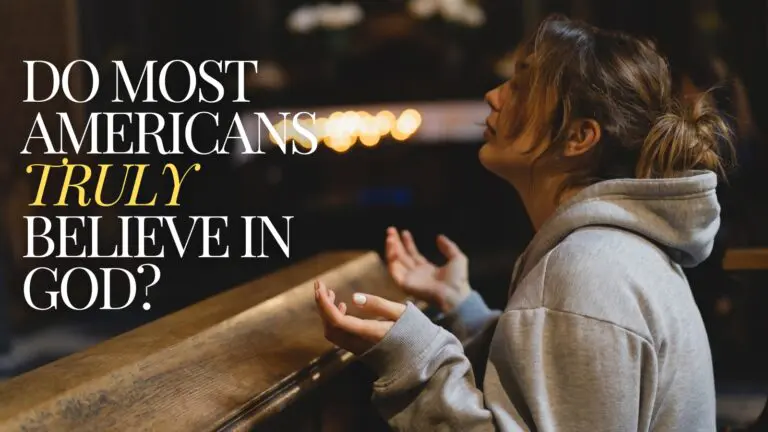
Do most Americans still believe in God? Though polls continue to show most of us say we do, they also reveal far fewer claim to than ever before, and substantially less than even a few decades ago, especially among the young who may just be the most honest since they have the least to lose (professionally or socially) by admitting their secularism.
U.S. church attendance has plummeted this century and never recovered from the Covid pandemic lockdowns. Loads of church members only go while they have children at home and then rarely or only on high holy days once the last child leaves the nest. In fact, over half of us are no longer affiliated with any religious denomination, and now far more churches close each year than open.
If we truly believe in God, then why do we sin so much? Anyone with even the vaguest familiarity with the major religions knows that all their holy books warn incessantly of an all-knowing God who judges each of us not just by our actions but even our thoughts, and that when we die, He will cast us into an eternally horrific Hell if we committed any number of a long list of sins. Does our far greater fidelity to governmental laws than biblical ones prove people have far more faith in the existence of the police, courts, and prisons than God, a Judgment Day, and Hell?
Does the fact that even so many self-proclaimed believers and regular church-goers appear to violate so many basic tenets of their faith suggest their religious affiliation may owe more to familial, cultural, and even professional commitments than spiritual ones?
In Your God is Too Small, the Anglican priest J.B. Phillips posits that most adults cling to a child’s conception of God. In this vein, how many folks only pray when they or a loved one is in crisis? To many “believers,” is God just another good-luck charm to be used when things get tough?
After history’s most violent century, and by far, could it be that people do not see evidence for God interfering in earthly affairs? Have all the 20th century’s terrible wars and genocide severely challenged many folks’ faith in a caring God?
Does God seem irrelevant in this most technological and secular of centuries, especially when so many of us have transformed science into a secular god and no longer acknowledge profound mysteries beyond the scope of man?
If we genuinely believe in God and His Heaven for folks who are good – and most of us think we are – then why, even when suffering terribly from cancer or other ailments, do we still resort to chemotherapy and other gut-wrenching modern treatments of doubtful effectiveness to prolong our lives, however painful? After losing their closest loved ones and enduring ever more lonely and difficult lives of ever-diminishing physical and mental health, why do so few believers commit suicide? As the atheist philosopher Ayn Rand asserted, if she believed in an afterlife where she would be reunited with her beloved late husband, she would have killed herself right away to join him.
So is the comic Adam Carolla correct that people “know they’re going to die and it freaks them out. So most people don’t have the courage to admit there’s no God and they know it. They feel it. They try to suppress it.” Is belief in God and the eternally blissful afterlife we hope awaits us merely soma to ease the ever-more-rapidly approaching reality of our permanent demise? To his credit, even the atheist Carolla confesses that, “secretly, I’m jealous” of folks who believe in an afterlife. This appears to confirm the devout Jew (and Carolla buddy) Dennis Prager’s contention that “Those who believe in nothing are very, very jealous and angry at those who believe in something.”
Whether or not we convince ourselves of God’s existence and a better afterlife, religion has enabled huge numbers of believers to become significantly better people. As the deistic but culturally Christian Ben Franklin asked, “If men are so wicked with religion, what would they be without it?” Indeed, as the Old Testament’s Book of Proverbs concludes, “The fear of the Lord is the beginning of wisdom.”
As proof, albeit with plenty of exceptions, religious families are far less likely to fall prey to social pathologies. Furthermore, our revolution and the abolitionist, women’s suffrage, civil rights, and other successful American reform movements were led by deeply devout Christians and Jews earnestly seeking to do what they believed God commanded.
Belief in God has also historically provided vast numbers of Americans with so much hope, solace, and meaning, attributes we desperately need to lead fulfilling lives but which appear to be in critically short supply with too many seculars. Is it only coincidental that at the very moment when we are the least religious, young people are more stressed and depressed than ever and the national suicide rate has spiked to record levels?
May we at least seriously consider God’s existence, study holy books and respected interpretations of them, not be afraid to discuss such fundamental questions openly and honestly, and never stop searching for the spiritual explanations that resonate the most and help us to reach our fullest potential.

Articles posted on LCI represent a broad range of views from authors who identify as both Christian and libertarian. Of course, not everyone will agree with every article, and not every article represents an official position from LCI. Please direct any inquiries regarding the specifics of the article to the author.
Did you read this in a non-English version? We would be grateful for your feedback on our auto-translation software.
), //libertarianchristians.com/wp-content/plugins/smartquizbuilder/includes/images/template6-latest.jpeg))

), https://libertarianchristians.com/wp-content/plugins/smartquizbuilder/includes/images/template6-latest.jpeg))








































), https://libertarianchristians.com/wp-content/plugins/smartquizbuilder/includes/images/template6-latest.jpeg))
), https://libertarianchristians.com/wp-content/plugins/smartquizbuilder/includes/images/template6-latest.jpeg))
), https://libertarianchristians.com/wp-content/plugins/smartquizbuilder/includes/images/template6-latest.jpeg))





*by signing up, you also agree to get weekly updates to our newsletter
Sign up and receive updates any day we publish a new article or podcast episode!